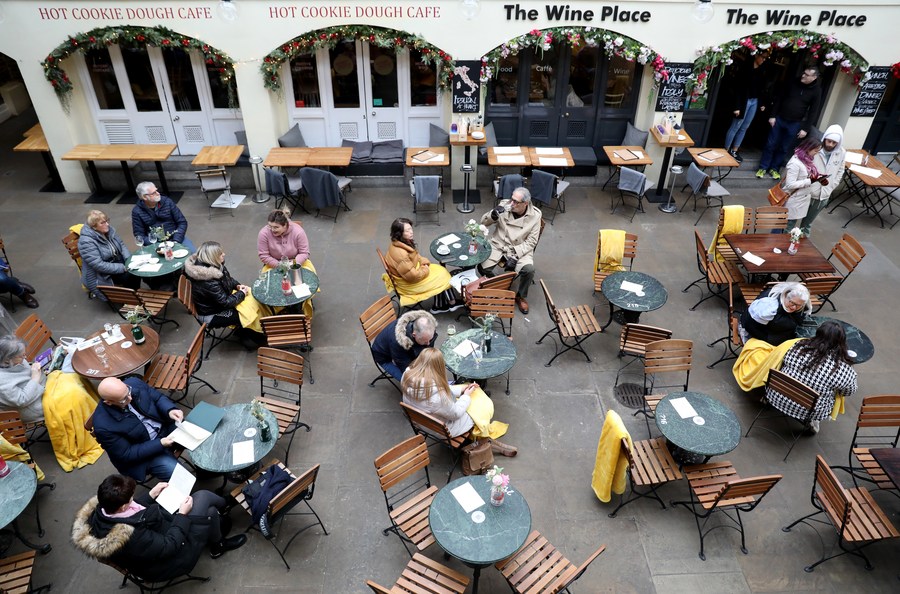
People dine outside Covent Garden in London, Britain, Feb. 10, 2022. (Xinhua/Li Ying)
The prime minister announced the lifting of all long-term coronavirus rules in Parliament as he unveiled the government's strategy for "living with COVID."
LONDON, Feb. 21 -- British Prime Minister Boris Johnson announced Monday the end of all domestic COVID-19 restrictions in England in a process starting later this week.
The prime minister announced the lifting of all long-term coronavirus rules in Parliament as he unveiled the government's strategy for "living with COVID."
The legal requirement for people who test positive for coronavirus to self-isolate will be removed from Thursday of this week, Johnson has announced.
"From 1st April, when Winter is over and the virus will spread less easily, we will end free symptomatic and asymptomatic testing for the general public," he said.
Johnson said it will mark a moment of pride after one of the most difficult periods in history as Britain begins to learn to live with COVID-19.
"The pandemic is not over but thanks to the incredible vaccine rollout we are now one step closer towards a return to normality and finally giving people back their freedoms while continuing to protect ourselves and others," he said.
More than 91 percent of people aged 12 and over in Britain have had their first dose of vaccine and more than 85 percent have received both doses, according to the latest figures. More than 66 percent have received booster jabs, or the third dose of a coronavirus vaccine.
"Britain will move from government restrictions to personal responsibility," said Johnson, adding contingencies will be maintained to tackle any future virus variations.
Saying people in Britain need to get their confidence back, Johnson added: "We chose to compel people to be considerate to others. We can rely on that sense of responsibility towards one another by providing practical advice in the knowledge that people will follow it to avoid infecting loved ones."
He said Britain's aim would be to manage future risks.
However, leading academics, medics and scientists expressed concern about the move, with many saying it is too early to ease restrictions while so many daily cases and deaths continue to be registered.
More than 1,300 scientists and medics have sent an urgent message to Britain's top two government medical advisers, England's Chief Medical Officer Professor Chris Whitty and Chief Scientific Officer Professor Patrick Vallance, expressing concern about the government plans to end testing, surveillance surveys and legal isolation of COVID-19 cases.
They called on the two to clarify the scientific advice underpinning the policy decisions.
They said in an open letter: "We do not believe there is a solid scientific basis for the policy. It is almost certain to increase the circulation of the virus and remove the visibility of emerging variants of concern. We believe humanity is in a race against the virus."








